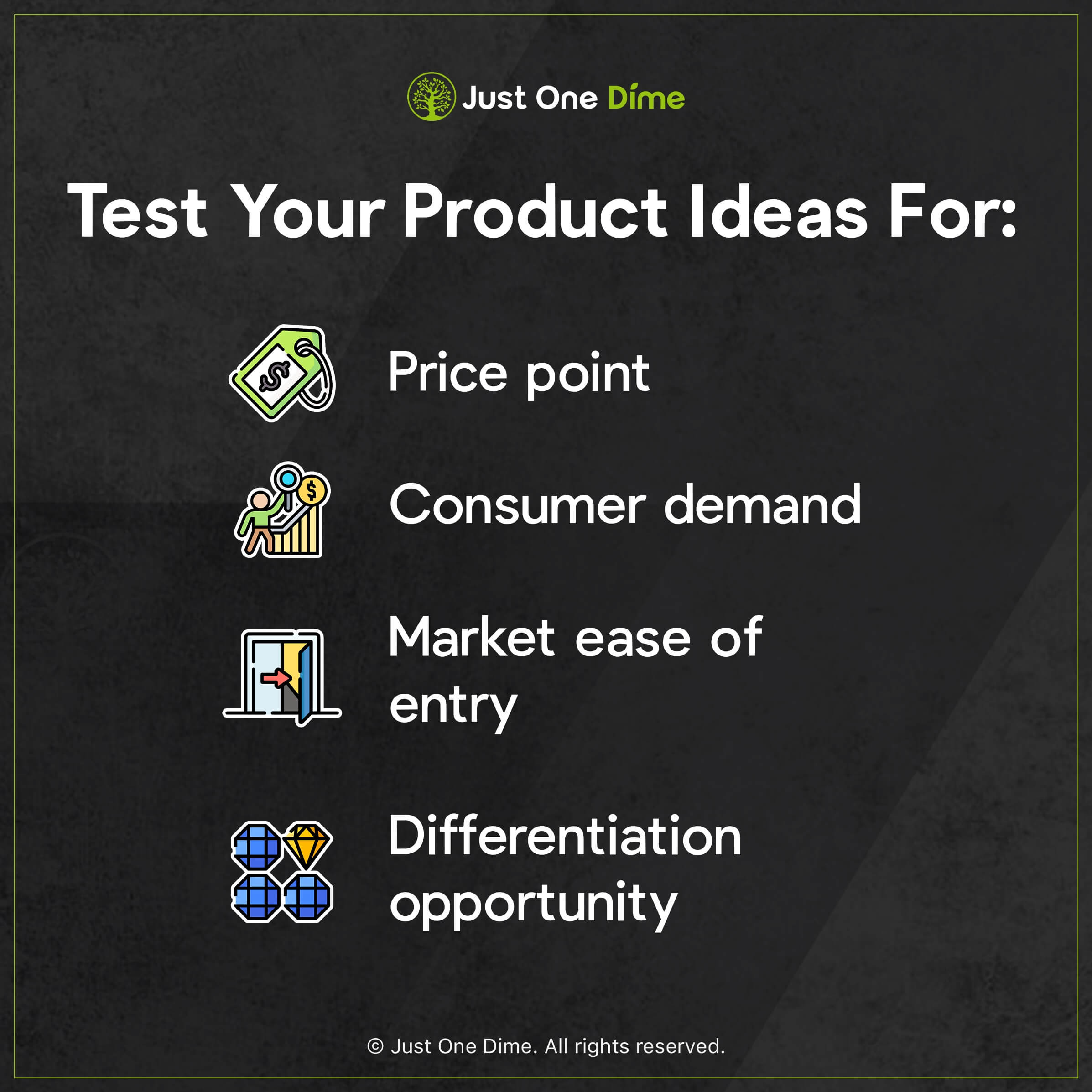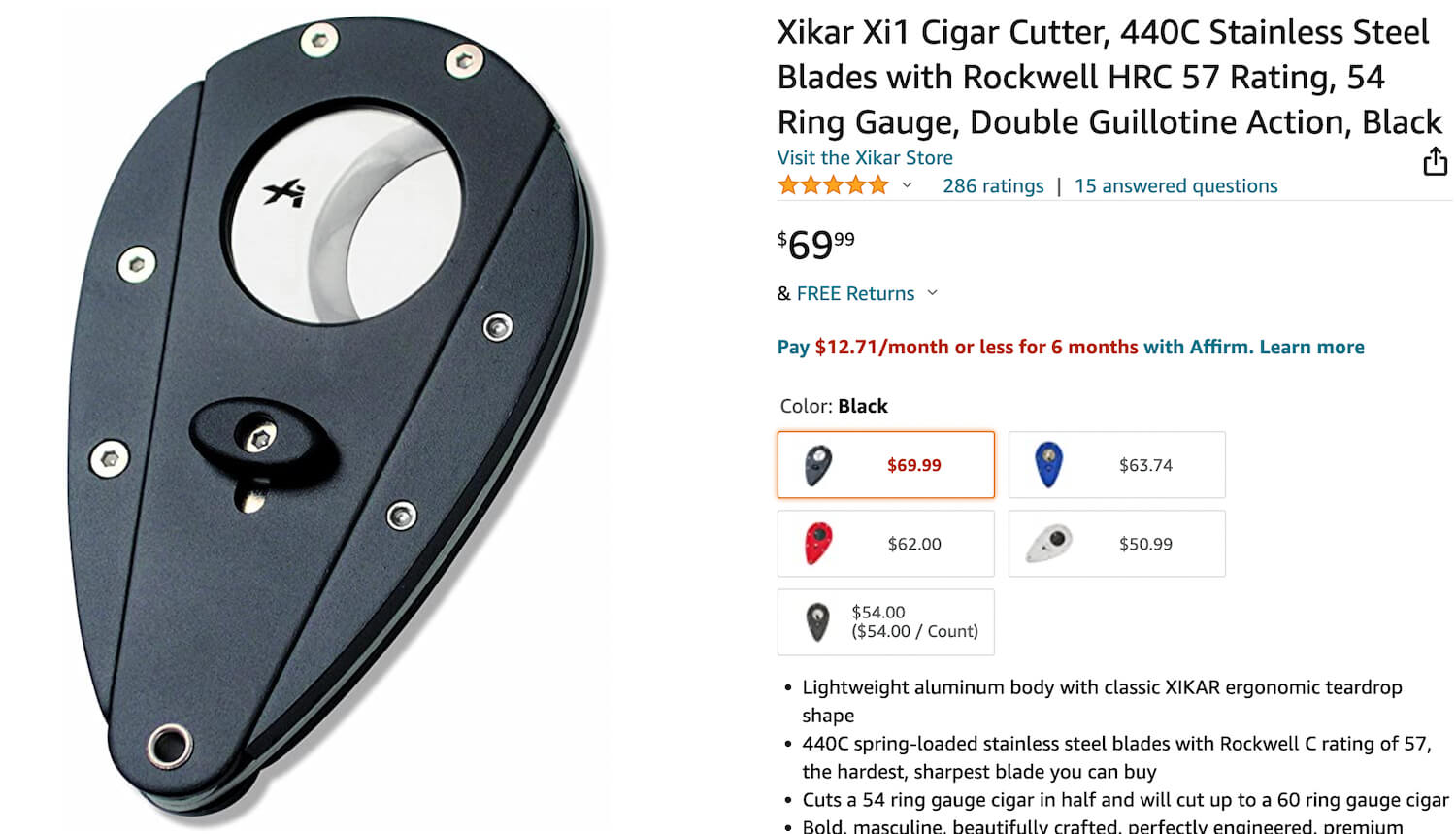In fact, it might even be on idea-overload. Of the dozens of ideas you’ve come up with, how do you know which one will make you money, if any of them?!
Today I will show you how to find and evaluate product ideas for your Amazon store.
Just One Dime’s product research method we teach in our Amazon FBA Mastery membership has helped dozens of students become millionaires and thousands more earn passive income that allow them to do the things they love with the people they love.
Test product ideas with Niche Hunter.
When you’re trying to figure out what product ideas you should turn into reality, start your list with anything that catches your attention. Think about activities and hobbies you like and products that would go along well with them. For example, if you’re a cigar aficionado, you might look into cigar cutters or holders.
Once you have a few ideas in mind, you need to test them all for:
- Price point
- Consumer demand
- Market ease of entry
- Differentiation opportunity

We can test all of these criteria with product research softwares like Just One Dime’s Niche Hunter. Click here to be the first to know once this product has been released.
To use Niche Hunter, install the chrome extension. Whenever you search a keyword on Amazon.com, Niche Hunter will show you tons of useful information, information that can tell you how strong a product idea is.
Let’s try it out.
Choose a product selling for over $30.
The first thing we want to test is the price at which we can sell our potential product.
Let’s say we’re considering cigar cutters. We type that keyword (word or phrase that shoppers search to find what they want to buy), “cigar cutter”, into the shopper search bar on Amazon.com.

Then, we hit the search icon, and let Niche Hunter do its thing:

(By the way, this is what Niche Hunter’s Amazon interface will look like!)
In Niche Hunter’s bottom left hand corner, we can see that the “Average Sale Price” of all products that rank for the keyword “cigar cutter” on Amazon is $10.89.

Since this average price is below $30, this is not a strong product to start with.
At Just One Dime, we always recommend you aim to find products that you can sell for at least $30, or $25 at the absolute minimum.
Why?
Amazon shipping fees and FBA (fulfilled by Amazon) fees are based on the size and weight of your product, not its inherent value or sell price. Therefore, your profit margins will be proportionately greater for a higher priced product than a lower priced one.
For example, let’s say you are trying to decide between selling a high-end cigar cutter or a less expensive cigar cutter.
In its retail packaging, the high-end cigar cutter measures 3.5” x 1” x 5” and weighs 3.21 oz. You can sell it for $70.

In its retail packaging, the less expensive cigar cutter measures 3.54” x 1.57” x 0.31” and weighs 3 oz. You can sell it for $15.

Assume each lighter costs $2 per unit to ship to an Amazon fulfillment center and that you will pay $1.50 in pay per click (PPC) advertising per unit sold.
Your fees to sell each product on Amazon and have the order fulfilled by Amazon are as follows:
- High-end cigar cutter: $2 to ship to a Amazon + $1.50 cost per click + $3.54 to fulfill = $7.04 in fixed fees
- Less expensive cigar cutter: $2 to ship to a Amazon + $1.50 cost per click + $3.54 to fulfill = $7.04 in fixed fees
I’ll show you how to find those fees here.
To understand how much of each sale goes to Amazon, we simply divide the total in fixed fees by the product’s sell price and multiply by 100 to express the number as a percentage.
By doing that, we now know that fixed costs alone will take up 47% of the price of the less expensive cigar cutter, but only 10% of the price of the high-end cutter.
In the case of the less expensive cutter, you have about $8 leftover that must also account for the supply costs to manufacture the product and the referral fee you pay to Amazon per item sold. However, with the more expensive cutter, you have approximately $63 leftover to account for these costs. You’re more likely to see (greater) profit margins from the more expensive option.

Since we want to find a niche that has an overall average selling price above $30, let’s try “cigar whiskey glass set”, instead. This product has a much more attractive average selling price: $34.38.

Now that we know it has a great price, we need to test this product for demand.
Choose a product with high demand.
Demand measures how much interest consumers have in a product. We measure demand by how much revenue the top ten organic (non-sponsored) listings make each month. And we can test this with Niche Hunter.
When we search “cigar whiskey glass set” on Amazon.com, Niche Hunter will show us how many of the top ten organic listings for that keyword do at least $5,000 in revenue per month.

That number looks pretty great!
At Just One Dime, we recommend you find a product where at least three of the top ten organic listings do at least $5,000 per month. However, you can adjust the amount of revenue you want to test for.
For example, if we wanted to see how many cigar whiskey glass set listings did at least $6,000 per month, we would adjust the parameters. Now we can see that there are still three listings that accrue $6,000 or more per month 👍.

Just because this is a stronger market niche, doesn’t mean we’ll necessarily be able to succeed within that niche. We have more to test.
Choose a product with high ease of entry.
Market ease of entry measures how easily a new seller could potentially break into a specific market niche. And we measure it by the number of reviews the top ten organic listings have.
Reviews indicate a certain degree of credibility and thus cause customer trust. Some markets are more willing to buy from newer listings with no reviews more than others.
The number of reviews on your listing versus your competitors’ is important because when your listing finally does show up, you will have no reviews. So you need to know if customers will be willing to buy your product regardless of that fact.
At Just One Dime, we recommend that you find a product where at least three of the top ten organic listings for a keyword have less than 100 reviews.
We can see from our earlier search that out of the top ten organic listings, there are exactly four listings which have fewer than 100 reviews.

Niche Hunter takes demand and ease of entry into account when it considers a product’s market potential. Which is why there’s a golden trophy that reads “Great” in the bottom left hand corner.

“Cigar whiskey glass set” has met the minimum criteria for both of these metrics.
Now that we’ve found a product that meets our market potential criteria, we need to see how we can improve upon existing listings.
Choose a product with high differentiation opportunity.
Differentiation opportunity refers to the ability to make a product uniquely different from the competition. In other words, how much opportunity is there to make our product better than our competitors’?
This is especially important for newer listings, since again, you will not have any reviews when you hit the market. You need to ensure there is something fairly obvious about your product that makes customers go, “Hmm, that’s interesting. I don’t see that attribute anywhere else.”
As you’re scouting product ideas, you want to pay attention to your potential competitors’ average star rating. This is a good way to determine if there is strong differentiation potential in the market niche.
For example, if several in the top ten listings have an average star rating of 3.5, and those products are still selling well regardless of the lower review rating, there are likely customers who want a better version of those products. That’s good news for you.
Niche Hunter can quickly show you this data, as well.
For our “cigar whiskey glass set” search, none of the top ten listings have a rating of less than 3.5 stars.

Don’t get discouraged by this particular result. There are other ways to look for differentiation opportunities other than the average star ratings.
Let me show you what I mean. In Niche Hunter, you can evaluate the top ten ranking listings (for a given keyword) and get invaluable data about those listings.

You can also navigate directly to any of those top ten listing’s pages. For example, we might choose to look at the “YouYah Cigar Whiskey Glasses with Cigar Holder-Set of 2”.

To scope out its reviews,
Hover over the down arrow to the right of the product’s average star rating.

Click “See all reviews”.

Click either “3 star” or “2 star” reviews.

Read through what these customers have to say about that particular product.
With this data, you get ideas as to what you can fix if and when you build your own cigar whiskey glass set. From this product’s reviews, for example, we can see that multiple customers think that the cigar holder on the whiskey glasses is too small for their fancier cigars. If you were to make your own version of this product, you already have an idea as to how to make it better than this rendition.

When you’re looking for ways to differentiate your product, reviews are a goldmine of customer data. However, you tend to find the most reliable information in the two and three star reviews.
One star reviews tend to come from customers who might be having the worst day of their lives and decided to take it out on a product that merits a two or three star rating on a better day.

Once you have a few product ideas that meet all of the criteria—sell price, demand, ease of entry, and differentiation opportunity—you need to compare them all to determine which one is the strongest for you to sell.

To do that, you will use our handy “Product Evaluation Tool” that we give to sellers as part of our Amazon FBA membership. And I’ll show you exactly how to use it here.
Where’s your favorite place to find product ideas? Let me know in the comments.

